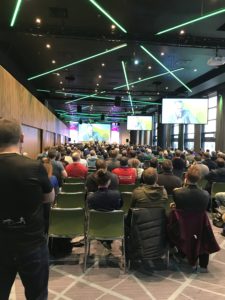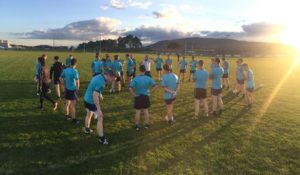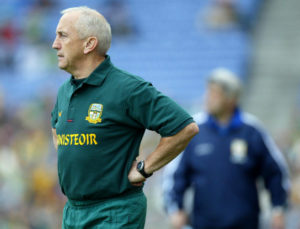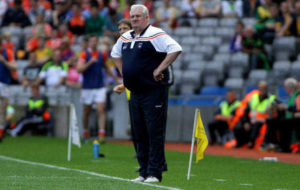 My motivation for my first blog of 2018 comes from the GAA Games Development Conference that was on last weekend in Croke Park. Another source of motivation for writing this piece is because a lot of club teams are starting to get back together now and new and existing managers and coaches are trying to plan the next 10 months out having commenced their pre-season preparations.
My motivation for my first blog of 2018 comes from the GAA Games Development Conference that was on last weekend in Croke Park. Another source of motivation for writing this piece is because a lot of club teams are starting to get back together now and new and existing managers and coaches are trying to plan the next 10 months out having commenced their pre-season preparations.
As a relative newcomer in the field of management and coaching (I am going into my sixth season), I was honoured to be asked by the GAA’s Games Development Committee to be part of a panel discussion alongside Peter Canavan (Tyrone great) and Peter Keane (Kerry’s All-Ireland minor winning manager). Our discussion was predominantly about the need to develop adaptability, creativity and spontaneity against formations and game plans as set up by our managers and coaches in the game presently. We also spoke about the importance of team play and individuals fitting into the plans of the management team. In a room where there was approximately 700 people throughout the day, I’m sure that quite a few coaches and managers felt that some of what we were saying was suitable to their team, and some of it simply was not. That is one of the most difficult parts of being a manager or a coach: deciding on what exactly it is that makes your team perform and to get the right results. 
As a manager, I absolutely love the idea of playing football the good old way of 15 v 15 and attacking at all costs but I’m also a realist and I know that this is not always possible as I quickly learnt in my first season in charge of my own club Killeavy. I was sending the team out to play attacking football with no defensive cover with relevant success until we came up against our closest rivals at the time, Silverbridge, in a league match. They simply ripped us apart and to be fair both teams played the same style. Attacking wing backs breaking up the field and adding to the firepower of both teams but they were simply better than us at that point. I didn’t realise it at the time and put it down to us having an off night but when they came to Killeavy and done the exact same to us then I had to learn and fast. Low and behold we drew each other in the championship and from the moment the draw was made I was adamant that we were going to surprise them by setting up defensively and hitting them on the counter-attack. We left three forwards up and retreated the rest back to different zones. My instruction to my players was to attack on mass when we intercepted the ball but quickly get back to provide cover when play broke down. We won because we changed. We had too.
Peter Keane said it last week himself: as a manager you can never decide on how you are going to play until you see and work with the players you have at your disposal. This is so true. You must be able to adapt.
 I am a fan of attending conferences like last weekend’s because it is a great opportunity to learn and to listen about the experiences of other coaches. My career is all about the process of learning right now and trying to establish myself as a manager/coach who has a unique way about preparing teams. I love learning and picking up wee nuggets from the likes of John Morrison, Sean Boylan, Joe Kernan, Jim Gavin and indeed managers from other sports. But what will make me different is developing my own ways of coaching and not just be part of the growing trend of GAA teams that play a certain way because the team down the road do it that way and it works for them. Be unique in your own right and do it the way that you believe in – that would be my biggest message to any coach or manager right now. Who cares what others are doing. Be more creative, develop your own training drills suited to your team, develop small-sided games that maximise player effort, and think outside of your comfort zone a bit more because that is how our game can really evolve.
I am a fan of attending conferences like last weekend’s because it is a great opportunity to learn and to listen about the experiences of other coaches. My career is all about the process of learning right now and trying to establish myself as a manager/coach who has a unique way about preparing teams. I love learning and picking up wee nuggets from the likes of John Morrison, Sean Boylan, Joe Kernan, Jim Gavin and indeed managers from other sports. But what will make me different is developing my own ways of coaching and not just be part of the growing trend of GAA teams that play a certain way because the team down the road do it that way and it works for them. Be unique in your own right and do it the way that you believe in – that would be my biggest message to any coach or manager right now. Who cares what others are doing. Be more creative, develop your own training drills suited to your team, develop small-sided games that maximise player effort, and think outside of your comfort zone a bit more because that is how our game can really evolve.
As part of pre-season, players just have to get fit. There simply is no way around this and it is a great chance to build camaraderie among the group. To get teams fit, there is a level of running that must be done. I’ll never forget one evening in Callanbridge after a gruelling session with Armagh when Paul Grimley got us to do 30 full-length runs from fence to fence in absolute gutters as fast as we could. Paul was the best coach I ever played under but he was one tough bastard. Whatever he said, we did.  The legs were simply hanging off us by the midpoint of each run but we just kept going. I hated it at the time, but as soon as they were completed and we were walking off the pitch there was a huge sense of satisfaction. The reality is, running drills like that must be done. I wish I was fit enough now to do them. Paul knew this and at the back of it all we knew it too. If a ball was thrown into the mix, it might have made it more enjoyable while getting the hard yards in and improving ball skills too.
The legs were simply hanging off us by the midpoint of each run but we just kept going. I hated it at the time, but as soon as they were completed and we were walking off the pitch there was a huge sense of satisfaction. The reality is, running drills like that must be done. I wish I was fit enough now to do them. Paul knew this and at the back of it all we knew it too. If a ball was thrown into the mix, it might have made it more enjoyable while getting the hard yards in and improving ball skills too.
Psychologically this is how players think. They play football after all, so don’t be afraid to use the ball.

Good piece. Well done Stephen.
Excellent article Steven. I’m new to management myself. It’s a huge eye opener and a massive learning curve. The one thing I try to do id appreciate the efforts being put in by everyone and also try to make it enjoyable, if thats possible. Always keen to learn.
Great piece Steven
I always believe one of the key points in been the best coach or manager you can be is to listen and not to be too stubborn and to be able to try something different if plan a doesn’t work so learning listening and trying new things is key to been a good manager in my opinion
Paul Coggins hope we can chat some time again Steven
Great piece Stevie – totally agree